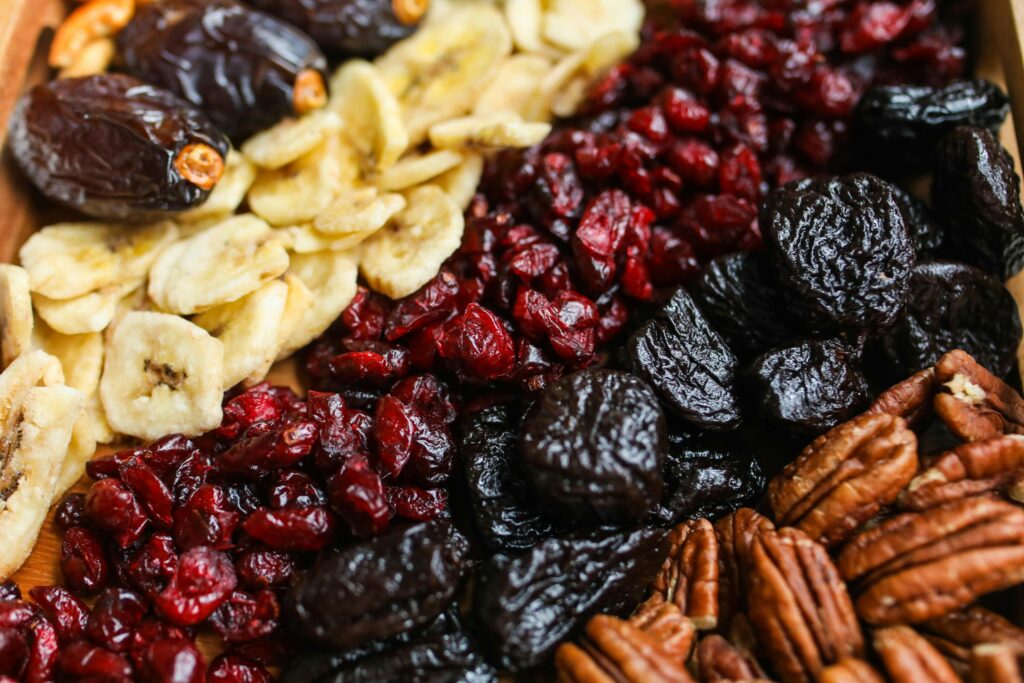
When it comes to nourishing our little ones, every parent wants to ensure they’re providing the best possible start in life. A balanced and nutritious diet is key to supporting their growth and development. While fresh fruits and vegetables are often the show’s stars, dry fruits—like almonds, walnuts, raisins, and dates—also play a crucial role in a baby’s diet.
Nutritional Powerhouses
Dry fruits are concentrated sources of essential nutrients. During the drying process, the water content in fruits evaporates, leaving behind a more concentrated source of vitamins, minerals, and energy. For babies, this means that even a small serving of dry fruits can pack a significant nutritional punch.
- Rich in Vitamins and Minerals Dry fruits like almonds and apricots are excellent sources of vitamins and minerals. Almonds, for instance, are rich in Vitamin E, which supports healthy skin and eyes. Apricots are high in Vitamin A, essential for vision and immune function. Raisins offer iron, crucial for healthy blood, and calcium for bone development.
- High in Fiber The fiber content in dry fruits can aid in maintaining healthy digestion. This can be particularly beneficial for babies who may experience constipation. Fiber helps to regulate bowel movements and promote overall gut health.
- Natural Energy Boosters Dry fruits provide a quick source of energy due to their natural sugars. This can be especially useful for active toddlers who need an energy boost throughout the day.
Dry fruits help babies gain weight as well as brain development. It can be given in paste form or as powder of it.
When to start giving dry fruits to baby?
Around 6-8 Months: Most pediatricians recommend starting solid foods around 6 months of age. However, dry fruits should be introduced a bit later, typically around 8-10 months, when your baby has a better handle on eating solids and is showing readiness for a more varied diet
.For Younger Babies: For babies under 8 months, dry fruits should be introduced in a very safe form, such as pureed or finely ground, to minimize choking risks.
Points to be considered: Ensure that your baby has developed some ability to chew and swallow effectively. This usually happens between 8-10 months of age, but it can vary. Dry fruits should not be given if your baby lacks these skills. Introduce new foods one at a time and observe for any allergic reactions. Start with a small amount and wait a few days before introducing another new food.
How to Introduce Dry Fruits
Choose Age-Appropriate Forms:
- For Babies Under 1 Year: Dry fruits should be finely ground, pureed, or softened before offering them to avoid choking hazards. For instance, you can blend almonds or dates into a smooth paste and mix them into your baby’s cereal or yogurt.
- For Older Babies (1 Year and Up): As your baby grows and their chewing skills improve, you can offer finely chopped or small pieces of dry fruits. Ensure that the pieces are small enough to prevent choking.
Safety Tips:
- Avoid Whole Nuts: Whole dry fruits, especially nuts, can be a choking hazard. Always chop or grind them to a safe consistency for your baby’s age.
- Monitor for Allergies: Introduce dry fruits one at a time and monitor for any adverse reactions. Common allergens include nuts, so be especially cautious when introducing these.
Incorporation into Meals:
- Mix with Other Foods: Blend dry fruits into cereals, yogurt, or smoothies to help your baby get used to their texture and taste. This can also make them more palatable and easier to digest.
- Healthy Snacking: For older toddlers who can handle small pieces, dry fruits can be a nutritious snack. Just be sure they are cut into appropriate sizes and not given in excess.
Signs Your Baby is Ready
- Shows Interest in Solid Foods: Your baby should be showing interest in different textures and flavors beyond pureed foods.
- Can Sit Up and Hold Head Steady: Proper head and neck control is important for safely eating and swallowing solids.
- Developed Chewing Skills: Although they may not have full chewing capabilities, some ability to mash food with their gums or teeth is needed.
Creative Ways to Incorporate Dry Fruits
Adding dry fruits to your baby’s diet can be both fun and creative. Here are some ideas:
- Smoothies: Blend dry fruits with fresh fruits and yogurt to create nutrient-rich smoothies.
- Cereal Toppers: Sprinkle finely chopped dry fruits over your baby’s cereal or oatmeal for added flavor and nutrition.
- Baked Goods: Incorporate ground or finely chopped dry fruits into homemade baby-friendly muffins or pancakes.
Dry fruit types with benefits and how to serve
1. Almonds
Benefits:
- Nutrient-Rich: Almonds are packed with Vitamin E, which is crucial for maintaining healthy skin and eyes. They also contain magnesium, which supports muscle and nerve function.
- Protein Source: They offer a good amount of plant-based protein, which is essential for growth and development.
- Healthy Fats: Almonds provide monounsaturated fats that are beneficial for brain development.
How to Serve: For babies, almonds should be finely ground or used in almond butter form to avoid choking hazards.
2. Walnuts
Benefits:
- Omega-3 Fatty Acids: Walnuts are a great source of alpha-linolenic acid (ALA), a type of omega-3 fatty acid that supports brain development and function.
- Antioxidants: They contain antioxidants that help protect cells from damage and support the immune system.
- Vitamins and Minerals: Walnuts are rich in B vitamins, magnesium, and phosphorus, which contribute to overall health and well-being.
How to Serve: Offer finely chopped walnuts or use them in a finely ground form. They can also be incorporated into baby foods like oatmeal or smoothies.
3. Raisins
Benefits:
- Iron: Raisins are a good source of iron, which is essential for preventing anemia and supporting healthy blood production.
- Fiber: They contain dietary fiber that aids in digestion and can help prevent constipation.
- Antioxidants: Raisins provide antioxidants that help fight free radicals and support overall health.
How to Serve: For younger babies, you can soak raisins in warm water to soften them and then mash or blend them. For older babies, chopped raisins can be mixed into cereals or yogurt.
4. Dates
Benefits:
- Energy Boost: Dates are high in natural sugars, providing a quick energy boost that is ideal for active toddlers.
- Fiber: They are rich in dietary fiber, which supports healthy digestion and can help alleviate constipation.
- Minerals: Dates offer essential minerals such as potassium, magnesium, and copper, which are vital for various bodily functions.
How to Serve: Dates can be finely chopped or pureed and mixed into baby foods. They are also great for adding natural sweetness to recipes.
5. Apricots
Benefits:
- Vitamin A: Apricots are rich in Vitamin A, which is important for vision, skin health, and immune function.
- Iron and Calcium: They contain iron and calcium, which support blood health and bone development.
- Antioxidants: Apricots provide antioxidants that help protect against cellular damage.
How to Serve: Dried apricots should be chopped finely or pureed for younger babies. They can be added to cereals, yogurt, or used in baking.
6. Prunes
Benefits:
- Digestive Health: Prunes are well-known for their natural laxative effect due to their high fiber content, which helps prevent and relieve constipation.
- Nutrient-Dense: They are rich in potassium, Vitamin K, and iron, which contribute to bone health and blood circulation.
- Antioxidants: Prunes contain antioxidants that support overall health and immune function.
How to Serve: Prunes should be chopped or pureed for younger babies. They can be added to oatmeal or mixed with other fruits.
7. Cashews
Benefits:
- Healthy Fats: Cashews provide healthy monounsaturated fats that support brain development and overall growth.
- Copper: They are a good source of copper, which helps in iron absorption and supports cardiovascular health.
- Protein: Cashews offer plant-based protein that is important for muscle and tissue development.
How to Serve: Cashews should be finely ground or used in a smooth cashew butter form to ensure safety for young children. They can be incorporated into various baby foods.
8. Figs
Benefits:
- High in Fiber: Aids in digestion and helps prevent constipation.
- Rich in Calcium: Supports bone health.
- Contains Antioxidants: Helps combat oxidative stress and supports overall health.
How to Serve: : Figs should be finely chopped or pureed for younger babies. They can be added to cereals or yogurt, or used in baked goods.
9. Pistachios
Benefits:
- Rich in Protein: Provides plant-based protein important for growth.
- Contains Healthy Fats: Monounsaturated fats that support heart health.
- Rich in Antioxidants: Includes antioxidants like lutein and beta-carotene, which support eye health.
How to Serve: : Pistachios should be finely ground or used in a smooth pistachio butter form for younger babies. They can be mixed into cereals or used in baking.
10. Hazelnuts
Benefits:
- Contains Healthy Fats: Rich in monounsaturated fats that support cardiovascular health.
- Rich in Vitamins and Minerals: Includes Vitamin E, magnesium, and copper, which support various bodily functions.
- Antioxidants: Provides antioxidants that help protect cells from damage.
How to Serve : Hazelnuts should be finely ground or used in a smooth hazelnut butter form for younger babies. They can be added to cereals, yogurt, or used in baking.
Each type of dry fruit offers unique nutritional benefits that can contribute to your baby’s health and development. By introducing these dry fruits in age-appropriate forms and using them creatively in your baby’s diet, you can provide essential nutrients that support growth, digestion, and overall well-being. Always ensure safety by preparing dry fruits to minimize choking hazards and monitor for any allergic reactions when introducing new foods.
Summary:
Starting to introduce dry fruits into your baby’s diet should be done with careful consideration of their age, developmental readiness, and safety. Begin around 8-10 months with finely ground or pureed forms, and gradually introduce small, safe pieces as your baby’s skills develop. By following these guidelines, you can ensure that dry fruits add valuable nutrition to your baby’s diet without compromising their safety. As always, consult with your pediatrician if you have any concerns or questions about introducing new foods to your baby.

This post is really informative and provides great insights! This post is really informative and provides great insights! I’m definitely going to share this with my friends. Fantastic job covering this topic in such depth! I’ve been searching for information like this for a while. This blogpost answered a lot of questions I had. Thank you for breaking down complex concepts so clearly. I’ve been searching for information like this for a while.
Discover your perfect shades with seasonal color analysis quiz and find your unique color palette.
Users can submit photos and receive expert analysis remotely, making it both accessible and efficient.